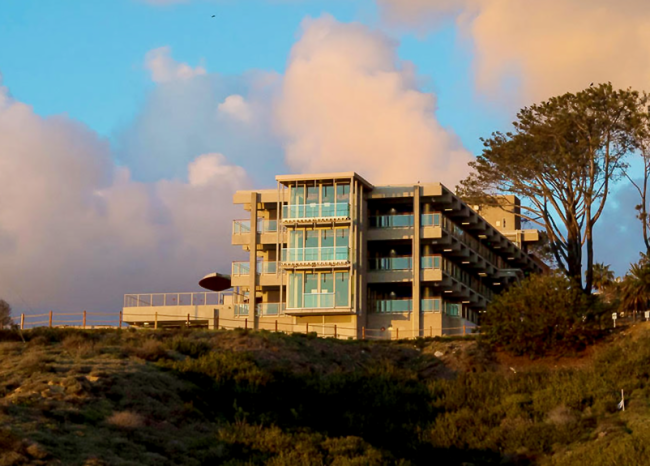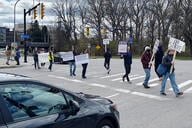You have /5 articles left.
Sign up for a free account or log in.

Three UC students are accused of defacing the San Diego campus’s Marine Conservation and Technology Facility in May.
UC San Diego
Jessica Ng, a University of California, San Diego, postdoctoral researcher, said campus police arrested her June 29 at her home about 10 miles from campus.
She said they handcuffed her and jailed her overnight.
“I was handcuffed to a chair,” Ng said of her time in a campus police holding room. She said she then spent the night in the Las Colinas Detention and Reentry Facility’s booking area.
She said two graduate student researchers were also jailed overnight on the same charges: felony vandalism and conspiracy to commit a crime.
All this was allegedly connected to a protest, a month before, involving washable sidewalk chalk and window markers.
“It really does seem like an attempt at union intimidation to throw three people in jail for alleged sidewalk chalk crimes,” Ng said.
On Tuesday—Independence Day—UC San Diego released a statement saying its police department had arrested two students and a recent graduate “in the felony vandalism of the Marine Conservation and Technology Facility on May 30.”
Ng, who works in the Scripps Institution of Oceanography, said her institution’s director, alongside donors and UC San Diego’s chancellor, were set to attend an opening ceremony for the building the following day. Campus academic workers have been protesting despite the end of their historic strike in December, saying the UC system isn’t honoring the deals it made to end that walkout.
The university’s statement said, “The vandals used materials other than chalk to deface the walls of the new facility, and those materials seeped into the concrete. The concrete had been specially treated to withstand the marine environment and had to be professionally repaired.”
The statement didn’t mention that they were postdoctoral and graduate student researchers in a union.
This required replacing “building materials in excess of $12,000” and last-minute relocations of events celebrating the building’s opening, the university said. It didn’t answer further questions from Inside Higher Ed.
Neal Sweeney, president of the union representing UC system postdoctoral scholars and academic researchers, said the university washed off the chalk the same day. An announcement for an upcoming rally to drop the charges says the washable markers were used on windows.
“They were expressing their views around the contract violations as workers,” Sweeney said.
“It’s part of a pattern of the escalatory actions of retaliation and cracking down on protest and free speech activities,” he said.
Rafael Jaime, president of the union representing teaching assistants, graduate student researchers and others (both unions are UAW affiliates), wrote in In These Times, “The UC is ringing in Independence Day with a message about our fundamental rights: Don’t fight back. Don’t demand what’s yours.”
Tanya Sierra, a spokeswoman for the San Diego County District Attorney’s Office, wrote in an email that the two defendants who have been publicly named—Ng and graduate student William Schneider—were “bailed out of jail and have been given a return to court date of July 10.”
But Sierra also wrote that the district attorney’s office hasn’t yet filed charges and hasn’t received the cases.
“A criminal investigation must first take place,” she wrote. “Once an investigation has been completed, law enforcement will submit their case to our office for review. Once we receive a case from law enforcement we will review it for potential charges.”
“The arrest standard for police is different than our standard for filing charges,” she wrote. “Police can make an arrest based on probable cause. Our burden of proof is beyond a reasonable doubt. I can’t speak to the status of the police investigation in this case, because I am not privy to it.”
Alex Morey, an attorney with the Foundation for Individual Rights and Expression, a campus free speech group, said, “Vandalism is not protected expression. Universities have policies on chalking, etc., that almost universally exempt building facades [from being allowed to be chalked].”
One of the unions has an online petition urging the university to drop the charges. The petition says the felony charges were for “allegedly writing messages in chalk and washable paint calling on UC to stop underpaying workers.”
It references the broader context.
“Last December, the University of California (UC) signed historic union contracts with over 48,000 UAW Academic Workers across the state,” the petition says. “Since then, UC has not only refused to implement the contracts they signed, but has retaliated against workers’ efforts to enforce our rights.”
“The UC has spent all of 2023 trying to circumvent our contracts,” Jaime, the graduate student researchers’ union president, wrote in In These Times. “They’ve failed to pay many of us our raises (Ng says she is owed over $3,500), canceled promotions and given new postdocs appointments half as long as the contract calls for. When workers have filed grievances, they’ve sometimes labeled them ‘ineligible for processing’ and spent months stalling. And when Ng, Schneider and their coworker (who did not want to be identified) reminded them of their legal obligation to obey the contracts—that is, when they engaged in the protected activity of a peaceful protest—they were arrested for their trouble.”
He also wrote that when the strike ended, “graduate student researchers (GSRs) came back to work to find that the UC had given many of them unsatisfactory grades in their ‘research credits,’ curricular cover for lab work that no GSR could have performed without crossing a picket line. After workers at UCSD handed their chancellor a ‘Most Overpaid Worker’ award at a $100,000 awards ceremony, UCSD administration filed student conduct charges against some 60 people, more than a dozen of whom weren’t even at the ceremony, and hung the threat of expulsion over them.”
Sweeney told Inside Higher Ed, “They’re trying to intimidate workers into silence, and we think they should drop all the charges immediately.”
“We’re just hearing from many, many people about how shocking this is—this intimidation against unionized workers exercising their right to free expression,” he said.
Ng said it’s not working.
“Workers across the state are extremely riled up,” she said. “There’s going to be a rally outside of the courthouse before the arraignment on Monday. People are ready to fight back.”




